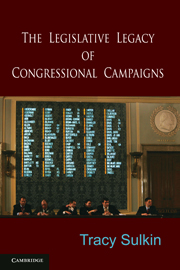Book contents
- Frontmatter
- Contents
- List of Figures
- List of Tables
- Acknowledgments
- 1 Promises to Keep?
- 2 Campaigns as Signals
- 3 Campaign Appeals and Legislative Activity
- 4 Mechanisms Underlying Promise Keeping
- 5 Promise Making and Promise Keeping on Defense and Environmental Issues
- 6 The Who, When, and Where of Follow-through
- 7 The Electoral Implications of Promise Keeping
- 8 Promises and Policy Making
- 9 Representation, Responsiveness, and the Electoral Connection
- References
- Index
4 - Mechanisms Underlying Promise Keeping
Published online by Cambridge University Press: 05 June 2012
- Frontmatter
- Contents
- List of Figures
- List of Tables
- Acknowledgments
- 1 Promises to Keep?
- 2 Campaigns as Signals
- 3 Campaign Appeals and Legislative Activity
- 4 Mechanisms Underlying Promise Keeping
- 5 Promise Making and Promise Keeping on Defense and Environmental Issues
- 6 The Who, When, and Where of Follow-through
- 7 The Electoral Implications of Promise Keeping
- 8 Promises and Policy Making
- 9 Representation, Responsiveness, and the Electoral Connection
- References
- Index
Summary
Two important findings emerge from the analyses in Chapter 3. First, linkages between campaign appeals and legislative activity are widespread, but are more common among members of the House of Representatives than among senators. Second, for members of both chambers, certain types of appeals serve as stronger and more consistent signals about legislative activity than others. What produces these patterns?
To begin, it is useful to return to the causal story about the mechanisms underlying promise keeping that I outlined in the introductory chapters. My argument was that appeals should serve as signals about activity to the extent that they are a function of legislators' relative levels of interest in an issue. If legislators choose to focus their campaigns on those issues they particularly care about (and only those issues they particularly care about), then we should see strong links between the content of their campaign agendas and the content of their subsequent legislative agendas and, hence, high levels of promise keeping. If, however, they select some or all of their themes for reasons that are not connected to their interest in and commitment to these issues, then fewer relationships should emerge. Along the same lines, among the group of candidates who talk about an issue, variation in the types of appeals they make should offer additional information about their future activity only if choices about language (i.e., positive versus negative, specific versus vague) are related to the intensity of their interest in it.
- Type
- Chapter
- Information
- The Legislative Legacy of Congressional Campaigns , pp. 78 - 98Publisher: Cambridge University PressPrint publication year: 2011



